Black Tooth Grin: The High Life, Good Times, and Tragic End of “Dimebag” Darrell Abbott
 I remember that I was dicking around at a Sydney Internet café in 2004 when I opened an email from my mom informing me that Pantera guitarist Dimebag (né Diamond) Darrell had been murdered by a crazed fan. You’d think that she was telling me my brother had died. The pain hasn’t faded with time. So when I received a galley from De Capo of the forthcoming Dime biography, I thought, “Hell, it’s about time.” The book comes out in May, and it will hold a place of honor on my bookshelf. You hear that, Jimmy Chen? Honor!
I remember that I was dicking around at a Sydney Internet café in 2004 when I opened an email from my mom informing me that Pantera guitarist Dimebag (né Diamond) Darrell had been murdered by a crazed fan. You’d think that she was telling me my brother had died. The pain hasn’t faded with time. So when I received a galley from De Capo of the forthcoming Dime biography, I thought, “Hell, it’s about time.” The book comes out in May, and it will hold a place of honor on my bookshelf. You hear that, Jimmy Chen? Honor!
The classical education I never had: Hippolytos
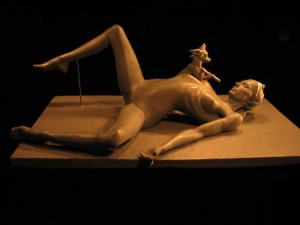 Hippolytos, the insufferable son of Theseus, was a celebutard of antiquity. In Euripides’ play, the dandy loves only two things: himself and the goddess Artemis. He’s even got an entourage to follow him around and tell him how great and pure he is. Yes, pure. He is untouched by woman, devoting himself exclusively to his chosen deity. The problem is, his chastity and vomit-inducing self-regard has pissed off Aphrodite, who takes his piss-poor attitude as an affront. Theseus is out of town, and Aphro believes the time of her revenge is at hand. Did I mention that Hippolytos’ stepmother is in forbidden love with her stepson? READ MORE >
Hippolytos, the insufferable son of Theseus, was a celebutard of antiquity. In Euripides’ play, the dandy loves only two things: himself and the goddess Artemis. He’s even got an entourage to follow him around and tell him how great and pure he is. Yes, pure. He is untouched by woman, devoting himself exclusively to his chosen deity. The problem is, his chastity and vomit-inducing self-regard has pissed off Aphrodite, who takes his piss-poor attitude as an affront. Theseus is out of town, and Aphro believes the time of her revenge is at hand. Did I mention that Hippolytos’ stepmother is in forbidden love with her stepson? READ MORE >
I wish I could say that I was tired of this news cycle
 If Justin Taylor has taught me anything, it that we won’t be able to beat the pirates until we understand the pirates. I’ve put together a quick primer for budding armchair piracy experts:
If Justin Taylor has taught me anything, it that we won’t be able to beat the pirates until we understand the pirates. I’ve put together a quick primer for budding armchair piracy experts:
1) Seven Tenths: The Sea and its Thresholds, by James Hamilton-Paterson. The ocean is vast. Real vast. Supports much life (including buccaneer life). Says Hamilton-Paterson:
It is well known in these parts that fish choose not to speak in order to risk nothing worse at men’s hands. Being wrenched from the depths into thin and bitter light to drown slowly in is bad, but not bad enough to merit speech.
Somali pirates can’t hold the jock of space pirates
 Back in ’93, a younger, debatably handsomer Drew Toal used to, before school, watch a pair of largely forgotten cartoons—Conan the Adventurer, as well as the poorly animated, yet colon-cleansingly awesome space drama, Exosquad. The latter, in particular, was—in the parlance of our times, “the tits.” It’s set in the future, as all worthwhile stories are, and chronicles the goings on of a group of soldiers in the Exofleet, as they battle the evil space pirates of Jonas Simbacca, and later join forces with him to fight a greater foe, the Neosapian menace (Perhaps one day we will have to strike an uneasy alliance with the Somali buccaneers against a resurgent Mongolian military? Time will tell). Now, the animation looks like it was done by a not-particularly-gifted two year old (creater Will Meugniot also made this terrible DragonLance cartoon adaptation awhile back), and the show was canceled before the story could be totally resolved, but man, what a story. So, yeah, I’ve been waiting patiently for about a decade for this business to come to DVD, and on April 14, my long wait appears to be at an end. Stop laughing at me.
Back in ’93, a younger, debatably handsomer Drew Toal used to, before school, watch a pair of largely forgotten cartoons—Conan the Adventurer, as well as the poorly animated, yet colon-cleansingly awesome space drama, Exosquad. The latter, in particular, was—in the parlance of our times, “the tits.” It’s set in the future, as all worthwhile stories are, and chronicles the goings on of a group of soldiers in the Exofleet, as they battle the evil space pirates of Jonas Simbacca, and later join forces with him to fight a greater foe, the Neosapian menace (Perhaps one day we will have to strike an uneasy alliance with the Somali buccaneers against a resurgent Mongolian military? Time will tell). Now, the animation looks like it was done by a not-particularly-gifted two year old (creater Will Meugniot also made this terrible DragonLance cartoon adaptation awhile back), and the show was canceled before the story could be totally resolved, but man, what a story. So, yeah, I’ve been waiting patiently for about a decade for this business to come to DVD, and on April 14, my long wait appears to be at an end. Stop laughing at me.
Hail to the hobo king
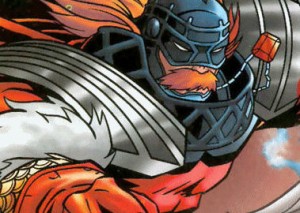
“It was all right,” said Norwood. “Some hobo got my boots on the train. He was one more slick customer. He took ’em right off my feet and I didn’t see him or hear him. Yeah, and I wisht I could get aholt of that sapsucker. He’d think boots. I wouldn’t care if it was the hobo king. It may of been the hobo king. He was plenty slick. Well, I’m not being serious there.”
“About what, the king?”
“They have a got a king. That’s right, this is no lie, I read this. They have got them a king just like England and France and he rules over every tramp in America just like…a king.”
Has anyone else here heard about this boxcar monarch? Is he in Bulfinch? I’m ready to swear allegiance to him right this second, I swear to gawd. Now taking applications for inclusion on a road trip to the Big Rock Candy Mountain.
The classical education I never had: Hekabe
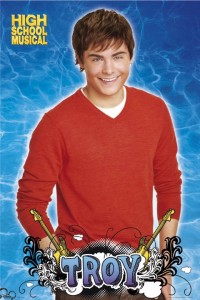
Thus was Hector smote. Smoten?
After reading Herakles, a play in which a man-god returns from hell only to savagely, accidentally kill his beloved wife and children, I figured I had seen the worst that Euripides’ Grief Lessons had to offer. I was wrong.
I have had for some years on my computer a file called “unpleasantness of Euripides,” in which I place at random thoughts on this subject, in hopes that the file will someday add up to an answer to the question, Why is Euripides so unpleasant? Certainly he is. Certainly I am not the only person who thinks so. Not the only person whose heart sinks at the prospect of reading, teaching or attending one of his plays.
Nice introduction. Anne Carson will translate Euripides, but she doesn’t have to like him. I respect that. In the second of four Grief Lessons, Carson introduces us to Hekabe, who bore many brave sons to Priam, the slain king of Troy (she also apparently “knew” some other fella and consequently popped out some “baggage” named Polydoros). After the sack of Troy, the ghost of Achilles shows up and demands a blood sacrifice. Hekabe’s daughter Polyxena pulls the short straw, and compounded as it is with news of her son Polydoros’s death by betrayal and drowning at the hands of the thrice cursed goat of a Thracian, Polymestor, you know Hekabe is gonna get pre-medieval on some poor fool. But who? READ MORE >
The classical education I never had: Herakles

One half of Power & Glory
I don’t know balls about the Greeks or antiquity, friezes or columns. I sort of remember reading Antigone in school, but don’t remember being all that interested in the degenerate offspring of Oedipus. Still, knowing the difference between the major Greek playwrights, or even just a workable understanding of the mythology, seems one of the marks of an educated person, and I find myself in the possession of two collections translated by the wonderful Anne Carson. The one, a collection of four plays by Euripides, is called Grief Lessons. Here, my internship begins with Herakles—Euripides’ take on the half-human son of Zeus, once ably portrayed by television star Kevin Sorbo. I wonder, was anything lost between the fifth century BC and mid-nineties USA programming? READ MORE >
Maybe the only thing college is good for these days
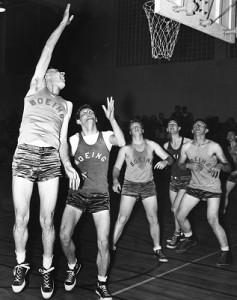 Yes. I speak of March Madness, which started about twenty minutes ago. Take a break from all the hand-wringing, keyboard headbutting and stylistic nose-picking. It’s a yearly dose of last-minute heroics and jingoistic chaos that is otherwise missing from our collective Calvinist nightmare, and I for one plan on ignoring work to ride the Golden Gopher.
Yes. I speak of March Madness, which started about twenty minutes ago. Take a break from all the hand-wringing, keyboard headbutting and stylistic nose-picking. It’s a yearly dose of last-minute heroics and jingoistic chaos that is otherwise missing from our collective Calvinist nightmare, and I for one plan on ignoring work to ride the Golden Gopher.
And just to make this a book post, check out this recent reissued gem. It’s about the 1979 Portland Trailblazers, and it will gut punch your life. Also: I heard Blake can dunk.
My therapist says I should meet new people: Short Letter, Long Farewell

I sat down on the edge of the bathtub, disconcerted because I had started talking to myself for the first time since I was a child. By talking rather loudly to himself, the child had provided himself with a companion. But here, where I had decided for once to observe rather than participate, I was at a loss to see why I was doing it. I began to giggle and finally, in a fit of exuberance, punched myself in the head so hard that I almost toppled into the bathtub.
What’s in your moat?
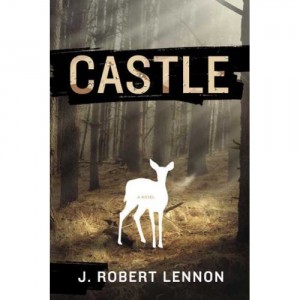
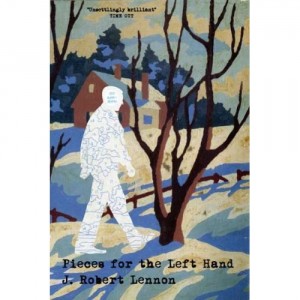
The worst one can usually expect from heading back home is an awkward encounter with an ex-girlfriend (“You look…great! No, you look great!) or reverting back to your 15-year-old self in the presence of your still-overbearing mother (“I can’t believe you put mayo on my sandwich, ma. Do you even know me? I’ll be in my room.”). The protagonist in J. Robert Lennon’s forthcoming novel Castle, though, has a far bigger, weirder and more sinister homecoming that involves bear traps, suspiciously altered documents and a fight to the death. I emailed a little with Lennon about his novel, as well as the book of short stories (Pieces for the Left Hand) that is being released the same day (March 31) and his one-man band, The Inverse Room. READ MORE >
